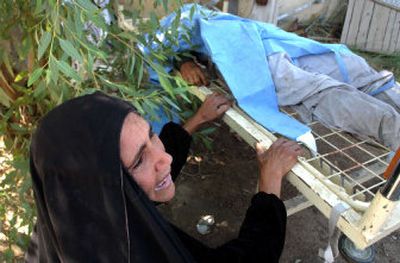Talk of civil war rises with attacks

BAGHDAD, Iraq – Retaliatory massacres by gunmen and bombers linked to rival Muslim sects have left more than 130 people dead across Iraq over the last 48 hours, the latest casualties of what some politicians now are calling an undeclared civil war.
At least 57 Iraqis were killed Tuesday and scores more injured when a suicide bomber lured a group of unemployed day laborers to gather around his explosives-packed minivan with the promise of work before setting off a detonation. The attack spread blood, burnt debris and charred body parts on a small market across the street from the Muslim bin Aqil mosque in Kufa, the main platform for radical Shiite cleric and militia leader Muqtada al-Sadr.
It was the latest in a series of atrocities perpetrated by Shiite and Sunni Arab Muslims that have left more than 6,000 Iraqi civilians dead since the start of May, according to a U.N. study and Iraqi police reports.
The new bombing, coming on the heels of a series of mass murders and bombings attributed to al-Sadr’s Mahdi Army militia and their Sunni Arab enemies, brought the battle to the Shiite cleric’s doorstep, igniting fears of a fresh wave of reprisal killings.
“The message is clear, and the message confirms the sectarian differences,” said Fadhel Sharaa, a leader of the Sadr movement. “It seems clear that it’s been moving toward the direction of civil war.”
U.S. and Iraqi government leaders have argued that a 150,000-strong foreign troop presence has held the country from descending into full-scale civil war. But many Iraqi officials now despair that the country already has passed the threshold.
“What is happening in Iraq is a disaster and a tragedy,” Adnan Dulaymi, a Sunni Arab leader, said in an interview. “It’s bloodshed and killing of the innocents, killing the elderly and women and children. It’s mass killings. It’s nothing less than an undeclared civil war.”
Many members of Iraq’s political class spoke gravely of the massacres and bombings of the past few days, even as two U.S. Cabinet officials traipsed through Baghdad’s Green Zone on Monday and Tuesday to tout Iraq as a potential bonanza for private investors.
The Iraqi Islamic Party, the largest Sunni Arab political group, warned Tuesday that “Iraq is witnessing a grave escalation in violence” and called on Iraqis “to return to their senses instead of slipping into the abyss.”
The upsurge in violence has terrified residents of Baghdad and other mixed Sunni and Shiite areas. The Baghdad airport has been flooded with Iraqis of modest means seeking to escape even temporarily the country’s upswing in murders based on religious identity.
According to a United Nations study based on Ministry of Health statistics, 2,669 Iraqi civilians were killed in May and 3,149 were killed in June. And this month, the rate appears to be accelerating, particularly in the Baghdad area where Iraqi security forces, on the heels of a mid-June visit by President Bush, had announced to wide fanfare a sweeping security crackdown plan aimed at quelling the violence.”Things are getting worse,” said Mahmoud Othman, a Kurdish lawmaker.
Even those hesitant to call Iraq’s ongoing sectarian violence a civil war have begun saying that the only way to diffuse the sectarian killings is nothing short of the international mechanisms used to mediate past ethnic, religious and political conflicts in Central America, the former Yugoslavia and Sri Lanka.
“I start to feel the need to say that there is a civil war,” said Salim Abdullah Jabouri, a Sunni politician, “in order to borrow the tools and solutions of past civil wars to apply them here, and to call upon the international community to deal with Iraq’s problems on this basis.”
The latest cycle of violence began with the July 8 bombing of a small Shiite mosque in the Jihad neighborhood of southwestern Baghdad. Shiite militiamen stormed the streets the next day, pulling Sunnis out of their homes and cars and executing them on the street.
“It is actually a civil war,” said Ayad Samaray, a leader of the Iraqi Islamic Party. “It is action and reaction. And it is increasing day after day.”
Iraq’s elected political leaders have floated several plans to contain the fighting, including the June Baghdad security plan that included new checkpoints and curfews and a requirement that Iraqis own no more than one automatic weapon and to keep it at home. That crackdown has been declared a failure by all but the most strident supporters of the current government.